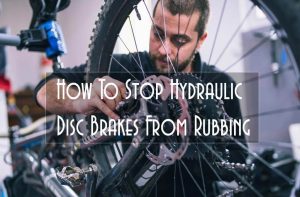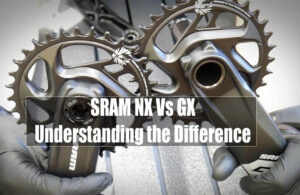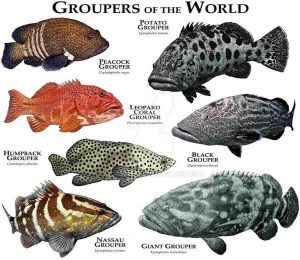But between mechanical vs. hydraulic disc brakes, which is the best to go for, and what makes them different?
Disc brakes have become popular with most manufacturers using them on their bikes over the years. These brakes that replace the rim brakes are common in gravel, endurance to peloton bikes, and come in two types. You can choose a bike with hydraulic or mechanical disc brakes and enjoy riding them.
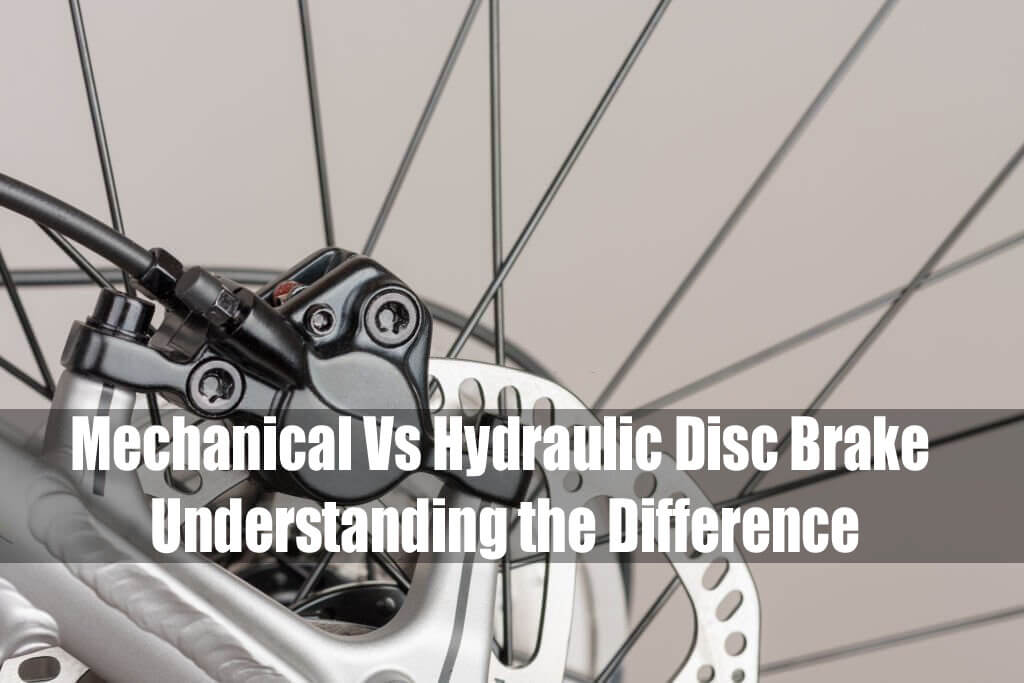
Mechanical Vs Hydraulic Disc Brake: Understanding the Difference
The difference between mechanical vs. hydraulic disc brakes lies in their braking mechanism, price, performance, and maintenance. The hydraulic disc brake is expensive but performs better than the mechanical disc brake.
If you have difficulties choosing between mechanical and hydraulic disc brakes, this guide will help you choose the best as we’ll delve deeper into the two.
What Is a Mechanical Disc Brake?
It’s best to know how each works before you understand the difference between mechanical vs. hydraulic disc brakes. The mechanical disc brake works the same way as rim brakes. It uses a steel cable connected to the brake lever and caliper to enable your bike’s wheel to stop.
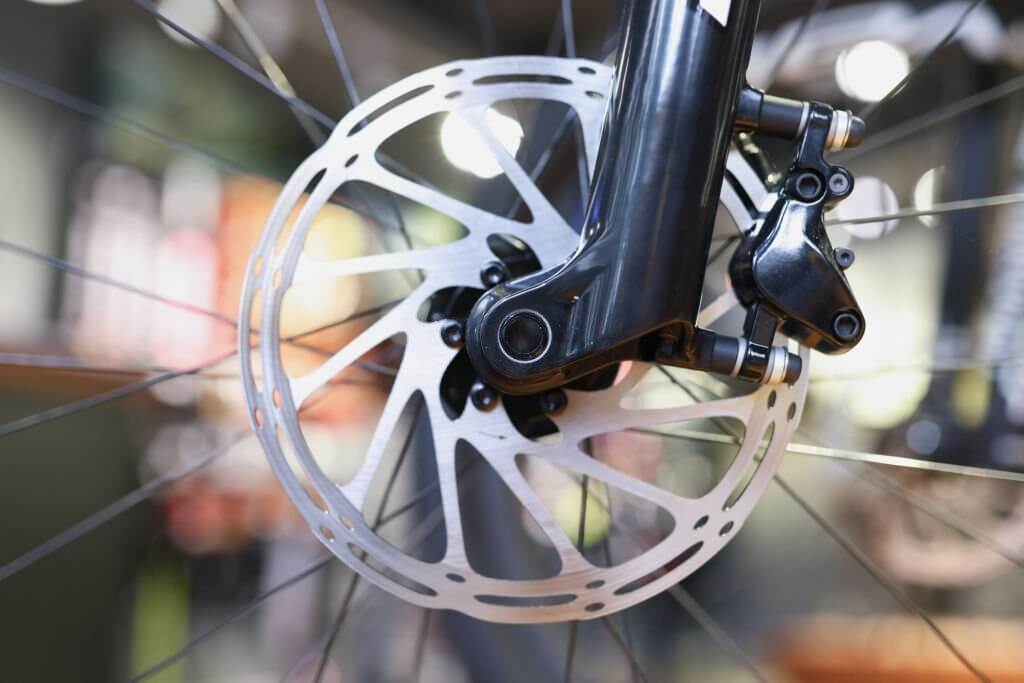
What Is a Mechanical Disc Brake
Most cable-operated disc brakes can be challenging to use as they tend to wear out and get damaged faster. The cabling system also undergoes a lot of friction, interfering with its lifespan. However, the mechanical disc brake is compatible with the normal rim brake shifters.
Pros
- It’s easier to find its replacement parts because it uses similar cables and levers as the rim brake.
- It’s cheaper
- It’s easy to repair and maintain
- It doesn’t require complicated tools for maintenance or repairs.
Cons
- It’s heavier
- The cables stretch, forcing you to make frequent adjustments
- It’s not easy to brake as your hands have to apply extra force for it to work
- It’s prone to wear and tear faster
- The brake pads tend to rub, making an inconvenient noise when not properly aligned.
Related: How To Drift A Mountain Bike: Crossing The Line Of Traction
Hydraulic Disc Brake
This disc brake works through a sealed fluid that transfers the braking force from the lever to the caliper. If you squeeze the lever, it will trigger the piston to move inside the cylinder, making the brake fluid reach the caliper. After that, the force will be transferred to the piston in the brake caliper, forcing the brake pads into the disc rotor, and reducing the speed at which the wheel rotates.

Hydraulic Disc Brake
Pros
- It requires less maintenance or adjustments
- It’s more efficient as it has great stopping power
- It works seamlessly as there’s no friction
- It’s lightweight
- It’s easy to operate as it doesn’t need extra force to work
- It enables you to drive at a higher speed because it can stop the wheel faster
- It’s a higher-end disc brake
- It doesn’t require regular cleaning as the brake system is sealed.
Cons
- It’s expensive
- It can be challenging to get spare parts in remote areas
- It requires special tools and fluid for servicing, which prevents you from doing repairs while on the trails.
- It’s difficult to maintain as you need to bleed the brake lines regularly.
Related: How To Fix A Broken Chain
Mechanical Vs. Hydraulic Disc Brakes
If you want to settle for the best disc brake, you’ve got to understand the major difference between the two. Both brakes will work best if you maintain and set them right.
The difference lies in their;
Stopping Power
When looking for a disc brake with good stopping power, go for a hydraulic disc brake. Its high stopping power makes it more efficient than the mechanical disc brake, as it multiplies the initial force when you press the brake lever.
It also doesn’t produce much friction when you squeeze the brake lever as the brake fluid moves through the line. This means you’ll not use much force but get high braking force reducing your cycling efforts.
However, the mechanical disc brake isn’t very efficient as some energy gets lost, making less force to reach the caliper from the brake lever. This happens because of the energy you apply to the lever, some of it is used to tame the friction caused by the cable as it stretches or works.
Related: How To Build Mountain Bike Jump
Brake Maintenance
You will also not have to do regular maintenance if your bike has a hydraulic disc brake. This is because it doesn’t have any cables that require adjustments as with a mechanical disc brake. However, you will need to replace the brake pads after some time as they’re prone to wear out.
The hydraulic brakes have a sealed system which requires less maintenance. Such a brake will not get dirt, sand, or dust build-up, which makes you do regular maintenance. Apart from that, its lines are air-tight and pressurized, so the chances of getting corroded or rusting are minimal.
In addition to that, the hydraulic disc brake is self-adjusting. This means the brake pads adjust themselves according to how the rotors are. Such also prevents the pads from rubbing while you use the brakes.
The major maintenance you should do is replace the brake fluid (bleed the brakes) after some use. It can be after 2 to 3 years, depending on how you use your bike. But you need to use specialty tools when bleeding the brakes like syringes, adapters, Allen wrench, and pliers.
This is different from the kind of maintenance you’ll do on a mechanical disc brake whose brake pads wear faster and the cables stretch while the brakes misadjust. So, you need to do regular maintenance after covering some miles to have your bike in perfect working condition.
You also need to clean the cable house, which holds dust, dirt, or debris. When you leave the brake with such contaminants, the friction level on the cable will increase, affecting the braking efficiency and resulting in more problems. Doing all this can be challenging. But if you regularly adjust or replace the cables with an Allen wrench, it won’t be much struggle.
Weight
Another difference that stands out between mechanical vs. hydraulic disc brakes is their weight. The mechanical disc brake is weightier than the hydraulic disc brake. The hydraulic disc brakes have lightweight calipers, which is attributed to the few movable parts. However, the weight difference doesn’t matter much when choosing any disc brakes.
Speed
Unlike the hydraulic disc brakes that enable you to drive faster, you’ll not be able to achieve that with a mechanical disc brake. You will have to start braking before reaching the stop point because the mechanical disc brake can’t brake immediately.
However, this will not be the case with a hydraulic disc brake, as it will make your bike stop immediately after you apply the brakes. You will, in this case, ride at higher speeds without worrying about the brakes disappointing you, especially when approaching a corner.
Cost
Before deciding which brake to buy mechanical vs. hydraulic disc brake, you’ve to consider your budget. If you want a cheaper one, go for a mechanical disc brake which you can get for about $35 as a complete set, including cables, levers, and rotors. You will also not spend much money maintaining this type of disc brake as you can do that by yourself.
However, you’ll have to dig deeper into your pocket to buy a hydraulic disc brake which is almost double the price of the mechanical brake. Maintaining this disc brake is also higher as you’ve got to buy brake fluid. It will even cost you more if you take it to a bike shop for repairs.
Hand Comfort
Which is comfortable on the hands between the mechanical vs. hydraulic disc brake, which is more comfortable on the hands? The mechanical disc brake will require you to apply more force to brake and do it frequently to control your speed. This can make your hands numb and painful after prolonged use.
Choose the hydraulic disc brake, which requires you to apply little force to stop the wheel from moving. You can also control it with one finger, allowing you to cycle over a long distance without your hands getting tired.
Related: How To Ride Berms: Navigate Banked Turns Successfully
Technology And Quality
Whenever you choose between mechanical vs hydraulic disc brakes, you’ve got to consider their quality and the kind of technology incorporated. In terms of technology, the mechanical disc brake is termed a low-end brake because it’s mostly found in low-end bikes. They incorporate less technology in making them, just as in rim brakes.
This means they are not as superior as hydraulic disc brakes, which are technologically advanced and used in most high-end and mid-range mountain bikes. The hydraulic disc brakes are also high quality, and many manufacturers incorporate them in their bikes.
Disc Brake Failure and Fade
There’s not much difference in how the brake fades on mechanical and hydraulic disc brakes. Remember, the brake fade is the reduction of the bike’s stopping power. The two types of disc brakes experience brake fade because of excess heat build-up in their systems, especially when riding on long and steep trails. The heat build-up results from friction between rotors and brake pads.
You are likely to experience brake fade when carrying a heavy load, riding faster or at high speed, and requiring more braking force to reduce your pace. You can stop this by taking a break and allowing the brake to cool off. Alternatively, you can install bigger rotors that don’t lose heat faster.
If your bike brake pads overheat, friction reduces, and you lose the braking power, which can be stressful for both the disc brakes. It can make your hydraulic disc brake stop working as the fluid also gets heated and starts to boil.
The hydraulic brake system will make the liquid’s boiling point stagnate if you constantly apply pressure on the brakes. But when you release the brake lever reducing the fluid’s pressure, it will begin to boil, making the brakes not work.
You can identify if your brake fluid is boiling since the lever will also stop working. This is after it moves inwards and does not make the wheel stop when you squeeze it. You can also experience such a challenge when the caliper and rotor remain hot after taking a break, making no air reach them. It can be disastrous when you are on the go while in the middle of the descent. But if you’re on a break and such happens, ensure you check on your brakes before proceeding.
Braking Consistency, Smooth Operation, and Control
Mechanical disc brakes create friction when the cables are working and, at times, rub. They also rust and get dirt/dust build-up, resulting in less smooth brakes. When the brakes have some resistance because of the dirt, you’ll have to use more force to have them operational, making the brakes less consistent. Using more force also makes mechanical brakes hard to control, requiring you to be more alert when riding.
On the other hand, a hydraulic disc brake allows smooth and consistent use. You will not have to apply extra force to have it operational because nothing holds it back, plus the brake fluid moves seamlessly through the line without creating friction.
Additionally, the system is sealed, giving no chance for dirt or debris accumulation. Because of no force application, you’ll have more control over the braking force. You will be able to control it with a finger preventing you from getting tired hands.
Related: How To Replace Disc Brake Pads
Spare Parts Availability
You will not have challenges getting the spare parts for mechanical disc brakes. These brakes share cables and levers with rim brakes, so getting their spare parts is easier. However, you might not get the spare parts for hydraulic discs, especially in remote areas. This means if you’re on a long-distance tour in a remote region, you will have to spend more days if your bike’s brake brings issues, as you’ll have to order online and wait longer to receive it.
Which Is the Best: Mechanical Vs. Hydraulic Disc Brake?
This question depends on your budget, where you prefer riding, and your personal preference. If you want a cheap disc brake whose spare parts are easy to find, go for a mechanical disc brake. However, if you want a high-end brake that’s easy to control, has a good consistency, and requires less maintenance, buy a hydraulic disc brake. When you opt for it, you need to be ready to dig deeper into your pocket and face challenges getting its spare parts.
Verdict
Choosing between mechanical and hydraulic disc brakes can be challenging if you don’t understand what sets each apart. However, after reading this helpful guide, you’ll realize that their difference lies in their maintenance, cost, performance, and weight.
The mechanical disc brake requires regular maintenance, unlike hydraulic disc brakes which are not too demanding on maintenance needs. However, the mechanical ones are much cheaper even though they require you to apply much force to have them work. Also, you will not strain your hands to control the hydraulic disc brake, which is more efficient and allows you to ride faster. The choice is now yours!






